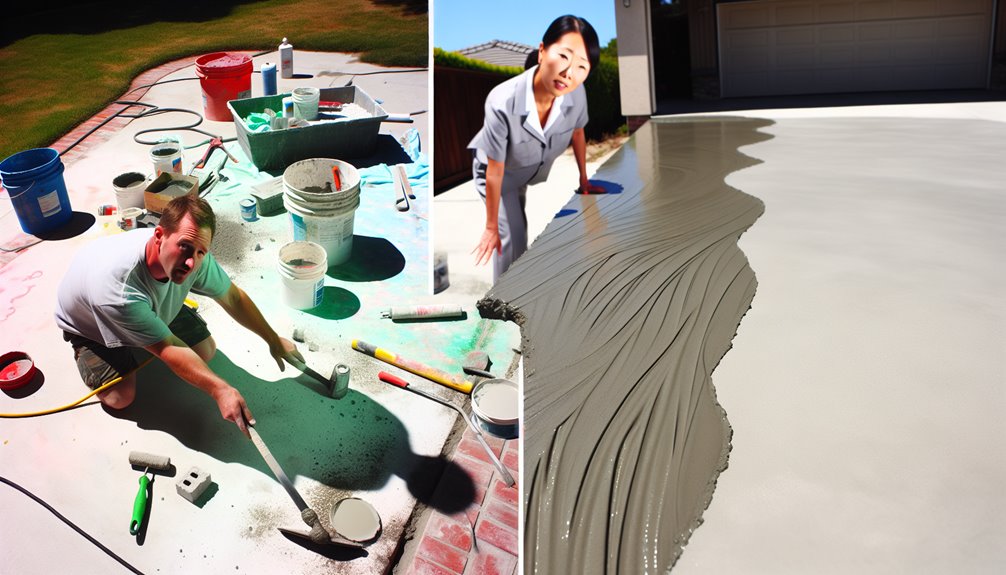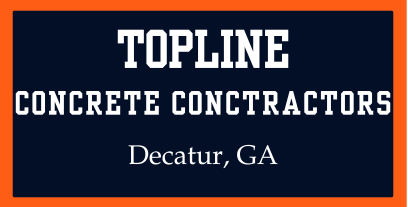
When you're contemplating a concrete project, you might think about tackling it yourself to save some cash. However, before you grab that mixer, consider the complexities involved and the potential pitfalls that could turn your DIY dream into a costly nightmare. Hiring a professional contractor can not only streamline the process but also guarantee a level of quality that's hard to achieve on your own. So, what factors should really influence your decision on whether to go it alone or call in the experts?
Benefits of DIY Concrete Projects
Initiating a DIY concrete project can be both rewarding and cost-effective. You get the chance to personalize your space while saving money on labor costs. One of the key benefits is that you can choose your materials and design, giving you complete control over the project.
With the right tool selection, you can achieve professional-looking results without breaking the bank. Invest in essential tools like a concrete mixer, trowels, and safety gear to guarantee a smooth process.
Effective project planning is vital. Before starting, sketch out your design and calculate the materials you'll need. This preparation helps prevent costly mistakes and guarantees you stay within budget.
You'll also gain valuable skills along the way, boosting your confidence for future projects.
Moreover, tackling a DIY concrete project can be a great bonding activity if you involve friends or family. Sharing the experience can make the work feel less intimidating and more enjoyable.
Ultimately, the satisfaction of completing a project with your own hands can't be overstated. You'll not only enhance your home but also cultivate a sense of pride in your handiwork.
Risks Involved in DIY Work
Starting on a DIY concrete project can come with significant risks that you should be aware of before diving in. One of the primary concerns is the safety hazards involved. Concrete work often requires heavy lifting, which can lead to strains or injuries if you're not careful.
Additionally, working with wet concrete exposes you to chemical burns, and improper handling of tools can result in accidents.
Another risk lies in the skill requirements for a successful project. If you lack experience, you might underestimate the complexity of mixing, pouring, and finishing concrete. Poor technique can lead to cracks, uneven surfaces, or structural issues down the line, which can be costly to fix.
Moreover, without the right knowledge, you may overlook essential preparations, like ensuring proper drainage or reinforcement. These oversights can compromise the durability of your project, making it more likely to fail.
Before you start, weigh these risks carefully. While DIY projects can be rewarding, the potential for injury and costly mistakes might outweigh the benefits if you're not adequately prepared or skilled for the task at hand.
Advantages of Hiring Professionals
When it comes to concrete work, hiring professionals can save you time, money, and headaches. With their expertise assurance, you can trust that the job will be done right the first time.
Professionals know the ins and outs of concrete mixing, pouring, and finishing, ensuring a durable and long-lasting result. You won't have to worry about mistakes that could lead to costly repairs down the line.
Additionally, contractors have access to quality materials that you mightn't be able to source yourself. They often have established relationships with suppliers, enabling them to secure the best products for your project.
This not only enhances the integrity of the work but also adds value to your property.
Moreover, professionals bring efficiency to your project. They've the right tools and equipment, which can save you from having to invest in expensive machinery that you might only use once.
With their skills and experience, they can complete tasks quickly, minimizing disruption to your daily life.
Cost Comparison: DIY vs. Professional
Concrete work can be a significant investment, and understanding the cost differences between DIY and hiring professionals is essential.
When you opt for a DIY approach, you'll primarily face material costs, which can vary based on the type and quality of concrete you choose. While you might save on labor expenses by doing the work yourself, don't underestimate the potential pitfalls. Errors in mixing or pouring could lead to costly repairs down the line.
On the other hand, hiring a professional contractor means you'll pay for both material costs and labor expenses. However, this often results in a higher-quality finish and fewer mistakes. Contractors come equipped with the right tools and experience to tackle the job efficiently, potentially saving you money in the long run.
You should also consider the time commitment involved in a DIY project. If you value your time or have a busy schedule, the convenience of hiring a professional might outweigh the initial savings.
Ultimately, weighing these costs—both monetary and time-related—will help you make an informed decision that suits your budget and project needs.
When to Choose a Contractor
Choosing to hire a contractor can be essential, especially if you're facing a large or complex concrete project. If your project involves intricate designs, specialized techniques, or significant structural demands, a professional's expertise is invaluable. They can navigate the project complexity that might overwhelm an inexperienced DIYer.
Additionally, consider your timeline. If you're working against a deadline, a contractor can help you stay on track. They've the resources and manpower to expedite the work, ensuring it's completed efficiently and on time.
DIY projects often take longer, especially when you're learning as you go.
Moreover, if you lack the necessary tools or equipment, the costs of renting or buying these can quickly add up. A contractor usually comes equipped with everything needed, which can save you both time and money in the long run.
Ultimately, when the stakes are high—whether it's safety, quality, or time—hiring a professional contractor is often the wiser choice. By doing so, you're investing in peace of mind, knowing that your concrete project will be handled expertly and efficiently.
Frequently Asked Questions
What Tools Do I Need for a DIY Concrete Project?
For your DIY concrete project, you'll need tools for concrete mixing, like a mixer or shovel, and surface preparation tools, including a trowel, float, and leveling board. Don't forget safety gear, too!
How Long Does a Professional Concrete Job Typically Take?
A professional concrete job typically takes one to several days, depending on the project timeline and job complexity. They efficiently manage tasks, ensuring quality work while minimizing disruptions to your schedule and property.
Can I Mix Different Types of Concrete for My Project?
You can mix different concrete types, but it's essential to understand the mixing techniques involved. Each type has unique properties, and combining them can affect strength and durability, so proceed with caution and knowledge.
What Permits Are Required for Concrete Work?
You'll need to check local regulations for permit types specific to your project. Building codes often dictate what's required, so make certain you understand these regulations before starting any concrete work to avoid fines or delays.
How Do I Choose the Right Contractor for My Project?
To choose the right contractor, check their qualifications and experience. Discuss project timelines upfront to guarantee they align with your schedule. Read reviews and ask for references to gauge their reliability and quality of work.
Conclusion
In summary, while DIY concrete projects can be rewarding, the risks and challenges often outweigh the benefits. Hiring a professional contractor guarantees your project is completed with expertise, quality materials, and efficiency. You'll save time, avoid costly mistakes, and achieve a durable result that adds value to your property. Ultimately, investing in a contractor gives you peace of mind and a successful outcome, making it a smart choice for your concrete needs.





